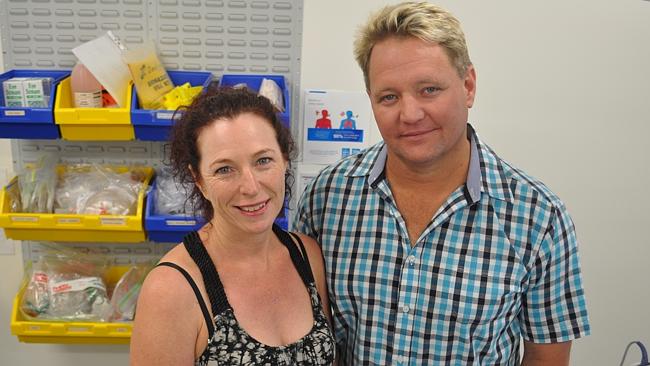
Ingham family medical practice owners Mandie and Brett Scott. Picture: Rachel Riley Source: News Corp Australia
A SMALL Queensland town has become an unlikely flashpoint for those seeking to scrap allegedly anti-competitive rules protecting the multi-billion dollar pharmacy industry.
A $12 million dollar medical centre in Ingham, one of the state’s poorest towns, has been put on hold because of an agreement between the industry and the Federal Government restricting where chemists can be located.
When local doctor Brett Scott decided to develop the new medical centre with a range of much-needed services including a CT scanner, day surgery, dialysis and a chemist, he thought he would be welcomed with open arms.
However, a campaign launched by the town’s local chemists and others against the proposal has delayed the project for over three years. The campaign culminated when one of the pharmacists moved his shop to within 500 metres of the proposed medical centre, successfully blocking the new development because of strict chemist location rules.
Under the Community Pharmacy Agreement between the Commonwealth and the Pharmacy Guild of Australia, a new chemist has to be located more than 500 metres from an existing pharmacy
The existing chemists claim Ingham is not big enough to support more than three chemist shops and the rules are vital to provide an adequate service.
Those rules are now under challenge from the Federal Government’s competition inquiry headed by Professor Ian Harper, who says the rules are anti-competitive.
Dr Scott said he was determined to press ahead with the development and had a pharmacy group still interested in moving into the centre.
“It is sad this development is being stopped,” Dr Scott said. “Rural areas do not get opportunities very often for these sort of facilities.”
He said the pharmacy was considered essential to the success of the project because it would have provided much needed income for the fledgling centre while it got on its feet.
“These medical centres are expensive to establish and can be risky,” Dr Scott said. “The pharmacy would have provided us with the financial assistance needed in the early stages.”
Brendan Seri, the co-owner of the chemist that moved to within 500 metres of Dr Scott’s medical clinic, defended the location rules. He said they were needed to provide a network of pharmacies in less affluent areas.
Mr Seri said if the pharmacy sector was deregulated it would result in supermarket chains such as Woolworths dominating the market.
He added the decision to relocate his pharmacy was based on the need for newer premises with better parking. He said the shop’s new location meant they had access to passing tourist trade.
Dr Scott said there was wide-spread community support for his project, with 5000 people signing a petition to ensure the location rules were not used to block the development.
It would mean patients, including the elderly and pregnant women, would not have to make the 100 km trek to the already overworked Townsville Hospital “These rules are more suited to the 1950s not 2015,” he said.
Former Federal Health Minister Peter Dutton last year declined to use his discretionary powers to overrule the location rules because he considered Ingham already had sufficient pharmacy facilities. Dr Scott however said the data provided to the minister was flawed, underestimating the population served by the existing chemists in town.
Customers often complained that the restricted opening hours of the existing chemists meant that they could not get much needed scripts filled promptly.
The professional union representing pharmacist employees said the outdated rules needed to be changed as they were stopping younger chemists opening their own shops.
Professional Pharmacists Australia campaign director Matt Harris said the Ingham situation was an extreme example of the anti-competitive effects of the rule.
